One general who was in the right place and at the right time "arranged" for France's victory in the Second World War. General Jean de Lattre de Tassigny cried and threatened to kill himself if he was not allowed to accept the surrender of Germany. He achieved his goal and thanks to him France was among the four powers that defeated the Third Reich and had the right to occupy Germany. It is also to him that we owe two inconsistent "Victory Day" dates - May 8 and 9.
75 years ago World War II in Europe ended. On May 2, Berlin surrendered, on May 6 Wrocław, on May 9, several German groupings cut off and the last fortress cities defending themselves in isolation for many months. There were fights here and there. Even larger and smaller German units broke through to the west to break free from the clutches of the Red Army and into American or British captivity, but the greatest military conflict in European history was already dying out. The cannons were to be silenced, and the words were to become the weapon.
The French general Jean de Lattre de Tassigny was one of the first to enter world politics with a loud bang. His character is completely unknown in Poland, which is a pity. Its effectiveness cannot be denied. Let's find out what he got up to ...
Germany wants and does not want to capitulate
The capitulation of the Third Reich in May 1945 was preceded by a series of complicated political and military events. The location of the anti-Nazi coalition troops on German territory was of great importance, and even greater - the earlier arrangements made in Yalta and Tehran regarding the post-war division of Europe. The Soviet Union was definitely leading the game of powers at that time whose armies had just beaten the Germans on the Oder, broke through to Berlin and captured it.
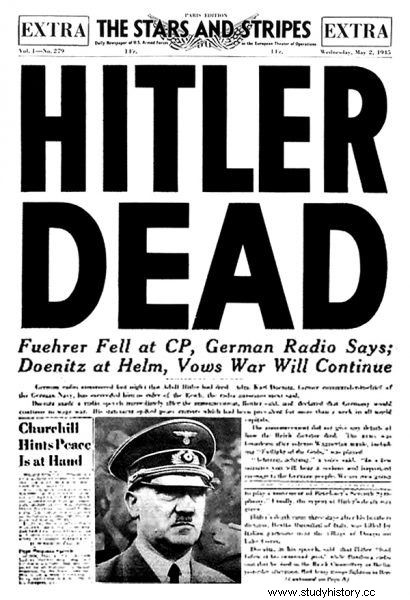
The cover of the American newspaper Stars and Stripes from May 1945
On April 30, 1945, Hitler committed suicide in a bunker in the Reich Chancellery and his body was burnt. Before his death, however, he made sure to select his successor. As he completely lost confidence in his generals and marshals during the battle for Berlin, he chose… admiral as the new leader. It was Grand Admiral Karl Dönitz, previously illuminated by the successes of the commander of the Ubootwaffe and the Kriegsmarine.
Admiral Dönitz was appointed President of the Reich, Minister of War and Commander-in-Chief of the Wehrmacht, Goebbels became Chancellor of the Reich (but soon committed suicide), Albert Speer was appointed Minister of Economy and Production, and Johann Ludwig Graf Schwerin von Krosigk took over the position of very important at that time , Minister of Foreign Affairs and Minister of Finance.
Germany's first surrender
Dönitz was at that time in Flensburg, a port city close to the Danish border, in territory not yet occupied by either the Western Allies or the Red Army. The only thing that could have been achieved in the last few days of the war by the new Dönitz "government" was to "redeploy" as many troops and civilians as possible from areas where the Red Army entered, to areas under American or British rule. The Nazis already knew exactly what the slavery in the USSR looks like and that one rarely returns from it. Compared to the Soviet one, the captivity of the Americans was almost a vacation. The dying Third Reich tried to sign a separatist peace with the US and Great Britain to get better conditions for Germany after the war, but General Dwight Eisenhower, the commander-in-chief of the SHAEF (Anglo-American forces in Europe) categorically opposed it.
It is not known why Eisenhower during this period relentlessly supported Stalin, cared for his interests and fulfilled all his whims, and even…. he anticipated the Soviets' demands. One of such "favors" was to wake the Germans out of their dreams by saying that there would be no separate surrender, and if they were reluctant to display white flags, bombers and artillery would do the job.
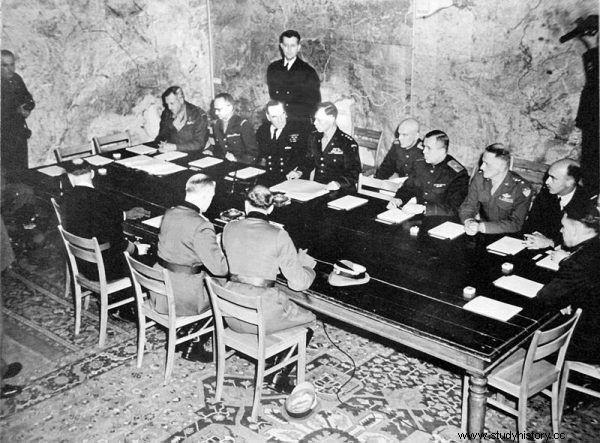
Signing the act of surrender
In the end, the last authorities of the Third Reich recognized the pointlessness of further resistance and on May 6 they decided to capitulate on the terms presented by the winners. Information about the will to sign the surrender was sent by radio to Eisenhower's staff. Immediately, on the same night, on May 7 at On 2.41, the first document on the unconditional surrender of German troops was signed at Ike's headquarters in Reims, France. The party assembling the weapons was represented by:General Alfred Jodl (Army), General Wilhelm Oxenius (Air Force) and Admiral Hans Georg von Friedenburg (Navy). They were delegated by Admiral Dönitz.
On the part of the anti-Nazi coalition, the act was signed by generals:American - Walter Bedell Smith and Soviet - Ivan Susloparov. A representative of France, General François Sevez, was present at the ceremony, but - which is worth noting - he only received the status of a witness-observer, not a party to the agreement. The French flag was not put up either, which - as it will turn out later - is very important. The signed document provided for the capitulation of the Third Reich from 23.01, May 8, 1945.
De Tassigny takes the stage
This modest, not quite solemn and inadequately publicized ceremony of signing the surrender enraged Stalin, who wished to repeat the ceremony, on his terms, in a place he had designated, in a symbolic place - in Berlin. As we know, Eisenhower did his best not to tease the Russian bear, so he agreed to it without talking. In order not to throw away the document signed in Reims, it was dubbed the "preliminary protocol of surrender".
On May 8, SHAEF representatives flew a Dakota plane to Berlin and landed at Tempelhof Airport, which was largely cleared from the fighting. A moment later, a German delegation from Flensburg arrived. A delegate from France, sent by de Gaulle, General Jean de Lattre de Tassigny, commander of the 1st Army, also flew in with Dakota.
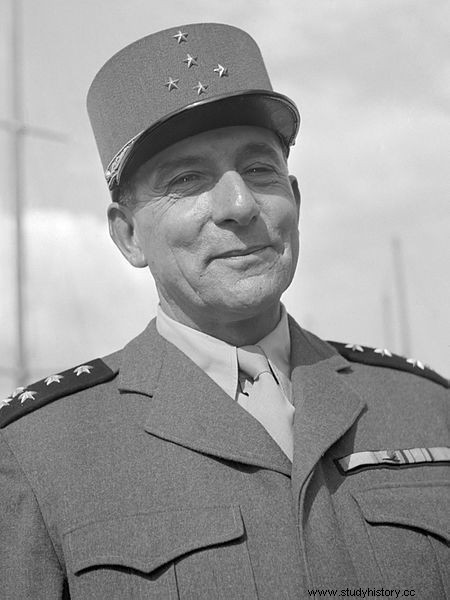
Marshal Jean de Lattre de Tassigny
In 1945, De Tassigny was 56 years old. He was a World War I veteran, during which he was wounded five times. He fought, among others under Verdun. During World War II he was the youngest French general. He commanded the 14th Infantry Division after the Germans entered France - his unit was one of the longest resisting and was not destroyed. Then, after surrender, he became an army general in the Vichy State, whose government formally cooperated with Germany. In 1941 he became the commander-in-chief of the French troops in Tunisia, and in 1942 the commander of the division in mainland France.
He was arrested for giving orders to resist the Germans entering Vichy territory in November 1942. He was demoted and sentenced to long imprisonment. In 1943 he managed to escape from prison to join the Free French troops fighting against the Germans. From 1943, he was a general in the armed forces of Free France; he commanded the French after the Normandy landings, and then even the Americans (SIC!) in Alsace. In the last two years of the war he was the commander of the 1st French Army. However, his most important battle in his life was to be played on May 8, 1945 in Berlin. He 'fought' all alone.
Second surrender of Germany
The ceremony of signing the surrender was to be held at the sappers' school in the Karlshorst district, where the headquarters of Marshal Zhukov's 1st Belorussian Front was located. Western Allied delegations and the Germans arrived there by car from Tempelhof airport.
On the Nenets side, the act of surrender was to be signed by:Field Marshal Wilhelm Keitel - commander of the land forces and Wehrmacht, Admiral Hans-Georg von Friedeburg - commander of the Kriegsmarine and Colonel-General Hans-Jürgen Stumpff - representative of the Luftwaffe command. On the side of the winning coalition, Marshal of the Soviet Union Georgy Zhukov, American General Carl Andrew Spaatz and British Air Marshal Arthur Tedder were to sign themselves. And here our hero, the brave General Jean de Lattre de Tassigny, appeared.
The general's tears
De Gaulle sent him to Berlin as a representative of the French government. In this way, he wanted to emphasize the participation of France in the war with Germany from the first to the last days of the war (France declared war on Germany on September 3, 1939). He also expected political gains.
De Gaulle bet on the right horse. De Tassigny played his role masterfully in Karlshorst. On May 8, at a crucial moment, he threatened the assembled representatives of the powers that he would commit suicide if he was not allowed to fully participate in the adoption of the act of surrender of Germany. He also demanded that the French flag be displayed.
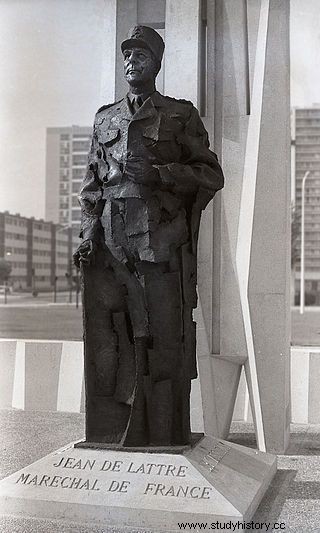
The Russians and Americans initially refused to agree to this, but the British supported the French. Some sources say that General De Tassigny started to cry. These tears seem to melt the hard hearts of the marshals who had just defeated Hitler! The Americans and Russians finally relented. I don't think they thought it through to the end…
After quick arrangements, the content of the capitulation agreement was slightly changed. The name De Tassigny was added, and a French flag was put in the room. The situation surprised and upset even the German delegation. Keitel noted that the French should sign the document for both the winners and the losers, as he served the Vichy State, which was an ally of the Third Reich, for some time.
Zhukov demanded that Keitel, Freiburg and Stumpff come to the table of winners and sign the capitulation document. The monocle fell out of his eye in nervousness, but he grabbed it and put it back in place with trembling hands. With sweeping movements, he signed five copies of the act of surrender with his pen. General Ivan Serov of the NKVD was looking over his shoulder. The ceremony ended at 23.43. The Germans were led out of the room and sent to Flensburg.
A cable was sent to Moscow informing about the signing of the surrender, and a grand banquet began in the barracks in Karlshorst, during which Soviet generals and marshals watered British and American commanders with vodka. The fun lasted until the early hours, even fat Zhukov was dancing, and no one worried about the hangover. There is no information about what De Tassigny was doing at the time. Maybe somewhere in the corner of the room he celebrated his triumph?
France as the fourth power!
His desperate threat of suicide (or maybe a calculated and deliberate act of political manipulation?) Had significant effects on the international arena. In fact, this gesture continues to this day! First of all, within a few dozen minutes, from an "ordinary" state fighting Germany in World War II, France became one of the four victorious powers. As such, it was entitled to the occupation zone of Germany, as well as a separate occupation district in Berlin. Jean de Lattre de Tassigny also joined the Allied Control Council of Germany, which operated in Berlin from August 1945 and exercised power over the occupied territory of Germany.
As part of the division of Germany into zones of occupation, France unexpectedly acquired the territory of the Rhineland, the former Duchy of Hohenzollern, the southern part of Württemberg and the southern part of the Free State of Baden, the Bavarian Palatinate and the city of Lindau on Lake Constance. The Americans gave some of these areas to the French "from their pool" , part British.
The territory of Germany, occupied by the French, had an area of 42,713 square kilometers and a population of almost 6 million. Of course, the winner's right was to take away from the occupied territory any material goods that the occupant only liked, including private property, collected only on the basis of "I see" a private soldier, let alone a general.
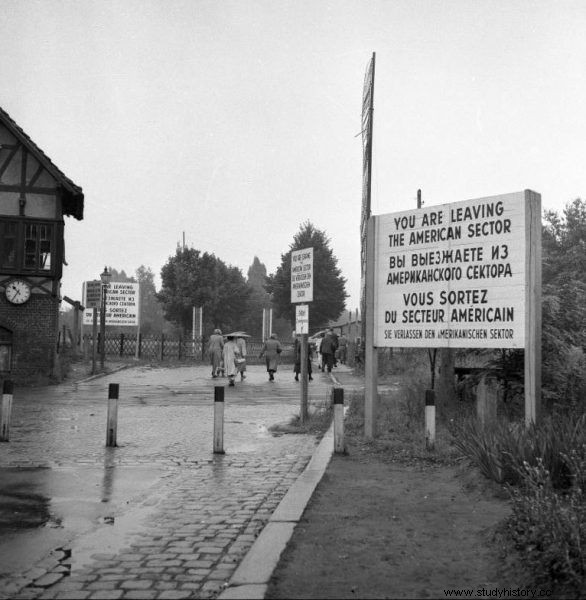
Sector boundaries, Berlin-Düppel, 1955
The performance of De Tassigny caused a lot of trouble in the plans for the post-war division of Berlin, because there was no separate part of the city for the French. The Americans entered Berlin on July 1, and British occupation units on July 2. As the Americans and Russians did not want to give up this time on a piece of the "Berlin cake" for the French, part of "their Berlin", and more precisely two districts:Reinickendorf and Wedding, were given to the "tricolor" by the English. One of the tasks of the French in the occupied part of Berlin was to destroy the monstrous anti-aircraft tower "Flakturme" that stood "in their district" Humboldthain. I wrote about it in the article on "Flakturmach".
The French zone of occupation existed until June 3, 1948, when it merged with the British and American zones. Later, these three districts became West Berlin. In turn, on September 7, 1949, the Federal Republic of Germany emerged from the combined occupation zones in the hands of Western countries.
De Tassigny's signature on the Karlshorst capitulation document gave Paris another "profit" of international scope and long-lasting effects. Since France was the "power" that defeated the Third Reich, it became a permanent member of the United Nations Security Council and is still so today.
Jean Joseph Marie Gabriel de Lattre de Tassigny died of cancer in Paris in 1952. He was posthumously appointed Marshal of France. It is hardly surprising because his services to the Republic are indisputable. His funeral was a great national celebration and millions of French escorted his coffin.
Victory Day, but when?
For almost 50 years after the war, half of Europe felt the effects of the "scene" organized by a French general. For this reason, the late evening's signing ceremony was significantly delayed. When it finally happened, it was May 8 in Berlin, and already 9 in Moscow. For this reason, until 1989 in the countries of the socialist camp "Victory Day" was celebrated on May 9, while in the West it was the day before. It was only in 2015 that the Seym officially changed this date and since then we officially celebrate the "Victory Day" on May 8.
The question of what victory we are celebrating in Poland on that day remains unresolved. You have to finally face the truth and admit that Poland ... lost World War II . However, we will write about it on the next occasion.
